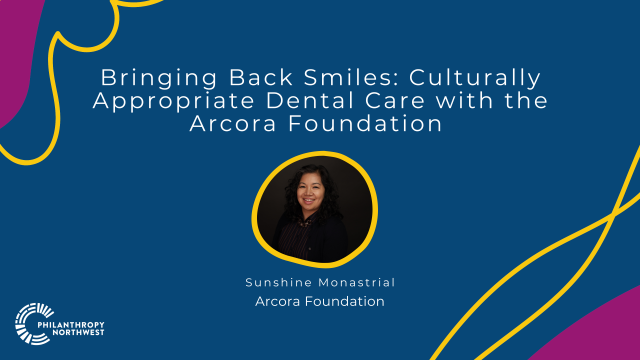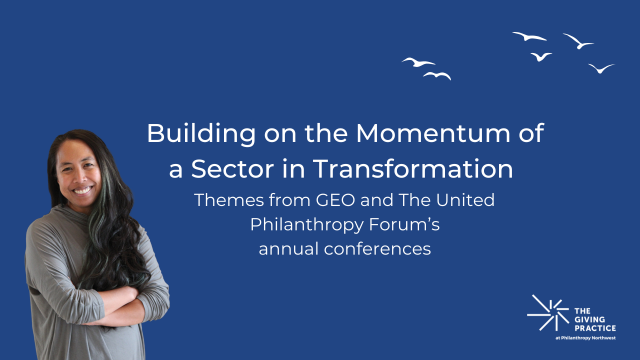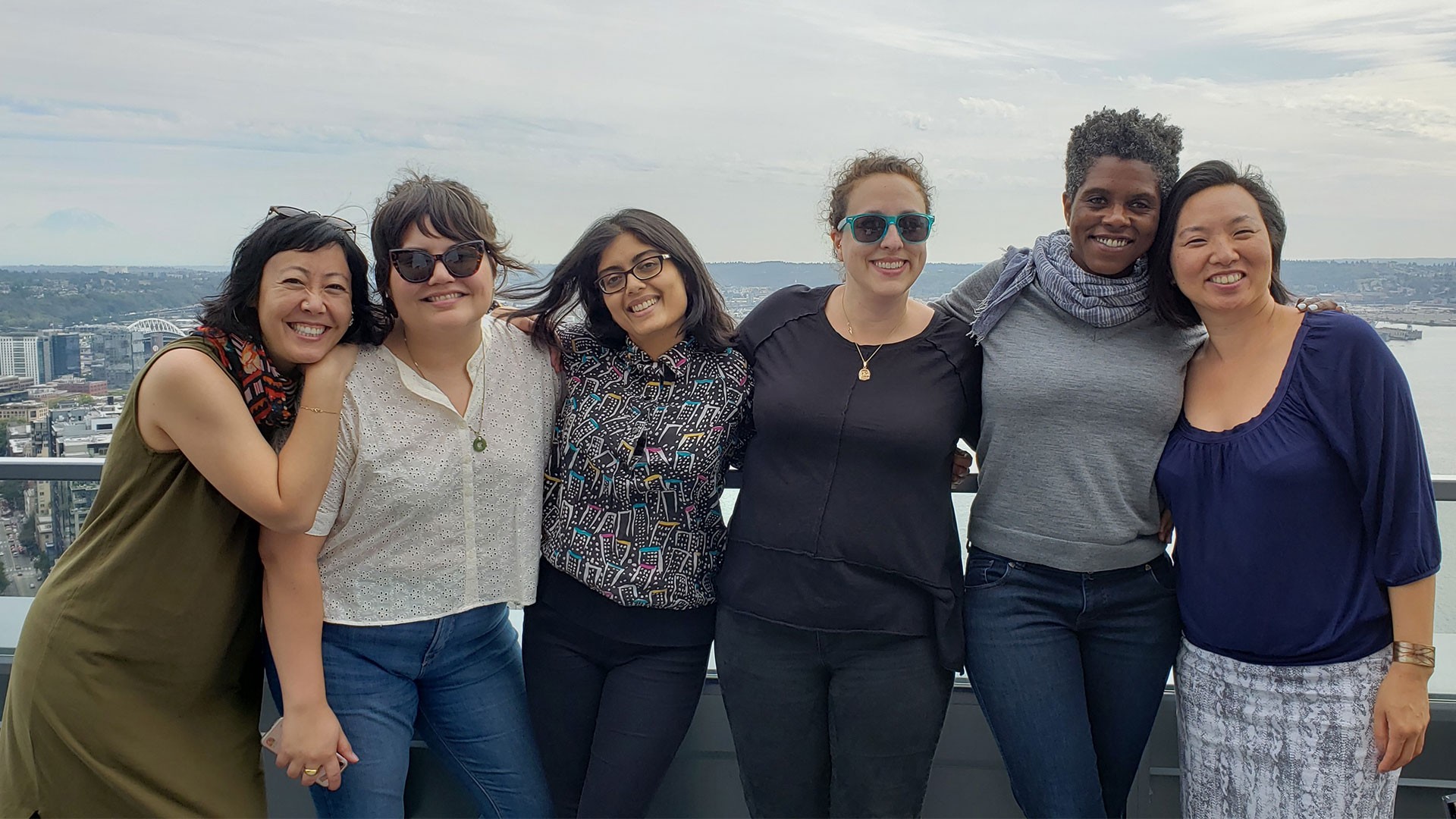
- Mijounga Chang is the organizational learning fellow at Meyer Memorial Trust in Portland and is currently finishing her master’s degree in collaborative design/design systems.
- Zeeba Khalili is the learning and evaluation officer at Marguerite Casey Foundation in Seattle.
- Denise Luk is the healthy environment program fellow at Meyer Memorial Trust in Portland.
- Ami Patel is the program manager at the Women’s Foundation of Oregon.
- Tonisha Toler is the community engagement and special initiative fellow at The Collins Foundation in Portland.
- Lauren Waudé is the housing opportunities program fellow at Meyer Memorial Trust in Portland.
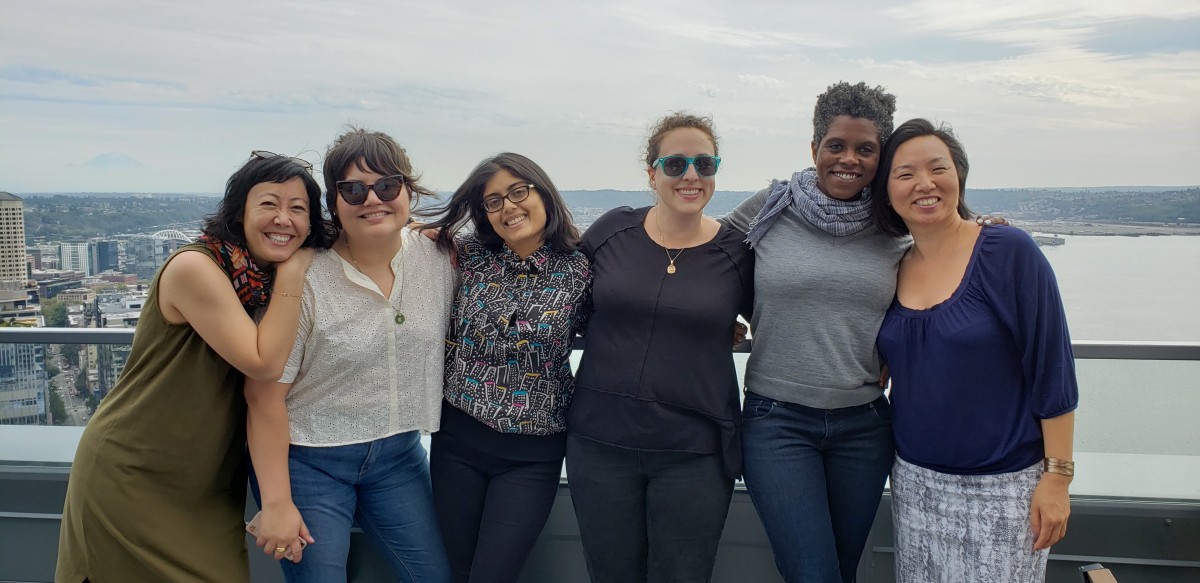
Chang
The Momentum Fellowship Program, hosted by Philanthropy Northwest, provides opportunities for individuals from communities underrepresented in philanthropy, particularly communities of color, to join the philanthropic field. The program, which is designed primarily as a professional development experience, offers individuals a robust learning opportunity through a full-time position at a foundation and a suite of activities coordinated by Philanthropy Northwest including executive coaching, leadership development opportunities and access to a cohort with peer fellows from other participating foundations in the Pacific Northwest.
The fellowship grew out of Philanthropy Northwest’s first CEO cohort on diversity, equity and inclusion (including Marguerite Casey Foundation, Meyer Memorial Trust, Rasmuson Foundation) who were interested in helping philanthropy become more welcoming to individuals from diverse backgrounds.
1. What aspect of the fellowship was most helpful to your professional growth?
Lauren: I can’t highlight the value of having such a strong, supportive cohort of brilliant women enough. Working through challenges together, sharing learnings and best practices, and knowing that I always had a group to go to for support allowed me to dive into the role, in a field completely new to me, with confidence and enthusiasm.
Denise: Yes! I agree. The fellowship with other women of color was key for my personal and professional growth. I feel like I expanded as a human—in leadership, in my equity lens, as a friend and colleague —from knowing each and every member of the Momentum cohort. My foray into philanthropy would have been unnerving without this community of peers.
Lauren: The professional coaching also kept me grounded, knocked away self-doubt that I had and allowed me to focus on my long-term goals.
Tonisha: The retreats and readings provided learning opportunities that we could use to strengthen us professionally in our roles. I grew confident in my skills and abilities in a conscious way. I learned to open my eyes to my natural strengths and how to focus on them to increase my effectiveness. Through these retreats and learning opportunities, I also learned about being vulnerable and asking for support from others.
Denise: Equally as valuable as all the other benefits in my fellowship was the access I had as a fellow. The past two years has been an eye-opening, surreal and sometimes heady experience in privilege. There were obvious areas of access that I had—like understanding how the funding world works and contributing to decisions about who gets funded—but I think the most impactful access for me was the opportunity I had to deepen my equity knowledge. I am grateful for the time I had as a fellow to build relationships with communities, adding another dimension to my equity journey.
2. What reflective practices did you use effectively during your fellowship?
Ami: Adaptive leadership has helped me reframe who has the power and agency to be a leader. We all have moments where we can exert leadership, and as a fellow in a small foundation, there were several moments when I stepped into a leadership role and helped shape the vision and approach of our grantmaking. I was able to look beyond the surface of a technical challenge to see the adaptive challenge underneath.
Mijounga: Indeed! All the fellows, including myself, experienced huge transitions personally and professionally during the past two years—becoming mothers, getting married, buying homes, starting grad school—all while realizing we could make a greater impact in philanthropy! At our respective foundations, we all wrestled with our roles as women of color, surrounded by great wealth and also great poverty and injustice. What really helped me was practicing collective sensemaking (with the fellows, my colleagues at work, other funders), learning how to be adaptive, and strategizing and course-correcting after reflection.
3. What was one of the most challenging aspects you faced in your role and what did you learn from it?
Zeeba: Assessing the impact of providing long-term, sizeable general operating support grants was an exciting challenge because the field is still learning how to tell the story of unrestricted funding, although it is not new. I’ve learned that we have to be creative in conducting these assessments and, most importantly, share our findings to help dispel the myth that general operating support cannot be learned from or assessed.
Ami: I learned it is important to leverage my power in philanthropy to meet communities’ needs. As a colleague of mine once stated, philanthropy is liberated gatekeeping. I have consistently tried to be accessible to community leaders, knowing they will share with me more freely as a woman of color. With those stories and suggestions in mind, I get to work on advocating for more access, more resources, more technical assistance and more flexible funding. I had to recognize I have power, and now I leverage that power with integrity, in service to a broader vision of justice.
Tonisha: While working with many different constituencies, including foundation staff, trustees and the community, it was often challenging to be inclusive of all voices and needs in decision making. I had to navigate a new organization’s culture, develop a new process and take the time to slow down when I encountered roadblocks. In the end, I deepened my ability to develop a program, to be more inclusive of all stakeholders connected to the process, to ask more questions, and to embrace and revel in the ‘oops.’
4. Which of your contributions to your foundation or the philanthropic field had the most impact?
Mijounga: Since I’ve worked in different functions in philanthropy prior to and during my fellowship (programs, grants management, president’s office), I had a strong understanding of foundation systems and practices. I was therefore motivated to figure out better ways we can do grantmaking across all our departments—and be more collaborative in general, as we ask of our grantees. I found that it makes sense to take a human-centered design (HCD) approach and to use HCD tools and practices that will further help us learn and work better together. As I increasingly became aware that this effort was tied to organizational culture, I also focused on addressing how we can work on and connect our culture to strategy.
Lauren: I came to philanthropy after twelve years of working with families experiencing housing insecurity and homelessness. At first, I felt intimidated by others in philanthropy—I was surrounded by lawyers, professors, CEOs—but over time I recognized my experience as an asset. My first-hand knowledge of different types of programming and government funding enhanced my team’s understanding of nonprofit housing providers’ needs. I believe that philanthropy has much to gain from the perspectives of people with direct service experience who can use their background to contribute towards an effective system change approach.
Denise: I saw that our outside perspectives, questions and curiosity about why things are the way they are, are extremely important to the evolution of equitable funding. I had an impact on how my portfolio thinks about funding holistically when it comes to the “environment.” If the current crisis of climate change isn’t clear enough—the pressing interests of community health, agriculture, food systems, indigenous knowledge and values, ecology, natural systems restoration and industry are also all related to the environment. The question is: How can we support work that benefits those communities most marginalized?
5. How do you envision incorporating your learnings from the fellowship into your next work? What new opportunities are you interested in exploring next?
Mijounga: I’m excited to continue using design strategies to curate conditions for transformative interactions, to enable culture shift and social change. Also, how to do powerful and meaningful collaborations—especially with unlikely partners and places! Collaboration (and co-creation) sounds great but I’ve always thought it was very hard to do successfully due to power imbalances, egos and untapped creative juices, among other things. But I’m just as much invested in the synergetic process as I am in the end goal.
Ami: The biggest thing this fellowship has offered me is space to ground into my truth. I am fiercely settled in my vision of justice. I look forward to building generative collaborations with communities and leaders, and to advocating alongside them in a truly expansive approach to systems change.
Tonisha: I will now start program and process development differently, aware of the ‘potholes’ and prepared for the new ones that may emerge. I will ask more questions and slow down to truly survey the ‘landscape’—culture, needs, desires, roles and systems—keeping my natural abilities and strengths at the forefront. I will continue to reflect on the aspects of adaptive leadership and change management as I move forward in doing more initiative development to support underserved communities. I’m continuing this work for my foundation and wish to eventually take this work nationally, using my skills to create inclusive community programs and processes.
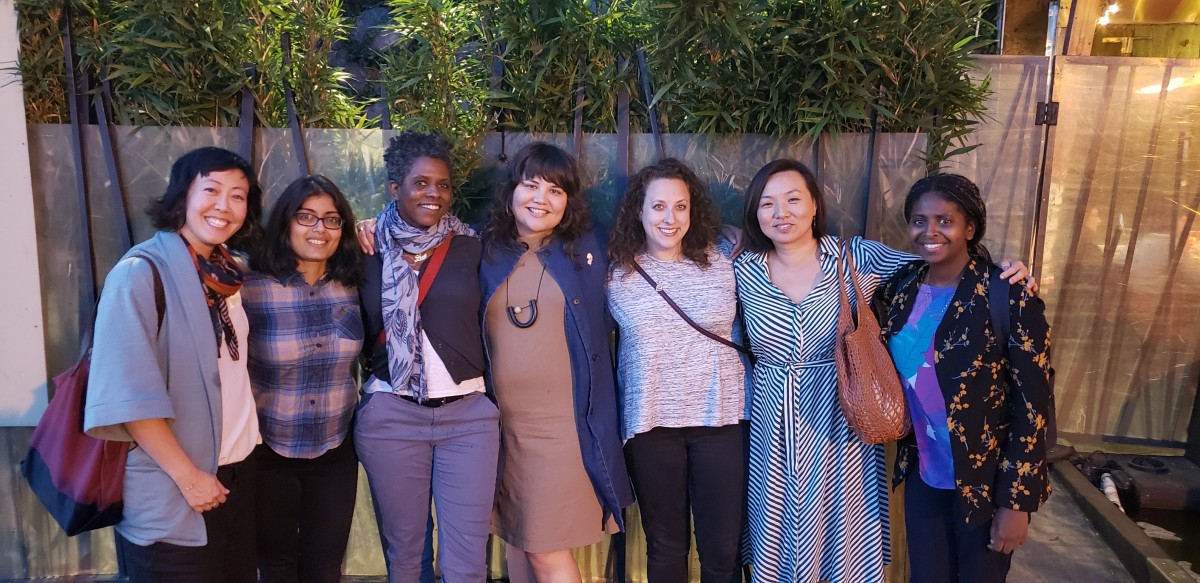
Chang, Mares Asfaha (Philanthropy Northwest
Program Manager).
6. What is another term you would use for “equity” and why?
Zeeba: Justice. It is when all people have what we need to be successful in life based on our own definitions of what success looks like.
Ami: Empowerment. We need to get out of the way and truly let folks in their own communities make decisions that will enable them to thrive on their own terms.
7. What are six words to describe the future impact of philanthropy in enabling social change?
Zeeba: Recognizing we can learn as funders.
Lauren: Systems Change - Less restrictions. More trust.
Ami: Start with humility and stay accountable.

